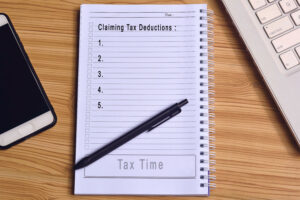Hey there, fellow taxpayer! Let’s be honest – nobody does a happy dance when tax season rolls around.
But what if I told you that with some savvy bookkeeping tricks, you could turn this yearly headache into a potential goldmine?
After years of learning the hard way (and yes, making plenty of mistakes), I’m here to share some game-changing hacks that could put more money back in your pocket.
Hack #1: The Digital Receipt Revolution
Gone are the days of shoebox accounting! Let me tell you about my friend Mike, who used to lose about 30% of his business receipts every year. Now he uses his smartphone like a financial superhero:
The Smart Way to Track Everything:

Are you looking for a reputable bookkeeper?
- Snap photos of receipts immediately (before they fade into oblivion)
- Use apps that categorize expenses automatically
- Link your business cards to expense tracking apps
- Set up email folders for digital receipts
Pro Tip: Name your receipt photos with the date and vendor (like “2024-01-15-OfficeSupplies”). Future you will be eternally grateful!
Hack #2: The Magic of Micro-Tracking
Think small expenses don’t matter? Think again! Here’s what I learned after tracking every single business expense for a year:
The “Small Stuff” That Adds Up:
- Coffee meetings with clients
- Phone apps used for business
- Partial home office utilities
- Professional subscription services
True Story: I found an extra $2,300 in deductions just from tracking these “tiny” expenses last year. That’s a nice vacation right there!
Hack #3: The Calendar Connection
Your calendar is secretly a tax document in disguise! Here’s how to make it work for you:
Smart Calendar Habits:
- Note the business purpose of every meeting
- Track mileage automatically with calendar integrations
- Document work-from-home days
- Record time spent on different income streams
Remember: The IRS loves documentation, and your calendar is like a time machine for proving business activities.
Hack #4: The Bank Account Ballet
Here’s a mistake I’ll never make again – mixing personal and business finances. Keep your money organized with:
The Three-Account System:
- Business Income Account
- All revenue goes here first
- Easier to track total income
- Clear picture of business growth
- Business Expense Account
- All business costs
- Dedicated business card
- Automatic categorization
- Tax Savings Account
- Set aside 25-30% of income
- Monthly automatic transfers
- No temptation to spend
Hack #5: The Quarterly Check-Up
Don’t wait until April to think about taxes! Here’s my quarterly ritual:
The 90-Day Review:
- Review all expense categories
- Update mileage logs
- Check for missing receipts
- Project tax liability
- Adjust tax savings if needed
Fun Fact: I caught a missed $500 deduction during a quarterly review last year. That’s like finding money in your couch cushions, but better!
Hack #6: The Deduction Detective
Time to channel your inner Sherlock Holmes! Look for these often-missed deductions:
Hidden Treasure Hunt:
- Professional development courses
- Home office internet (partial)
- Banking fees
- Professional association dues
- Software subscriptions
- Cloud storage services
- Health insurance premiums (if self-employed)
True Story: A freelance designer I know deducted her Adobe Creative Cloud subscription, professional organization dues, and online courses – totaling over $1,800 in deductions she almost missed!
Hack #7: The Automation Advantage
Let technology do the heavy lifting! Here’s my automated system:
Set It and (Almost) Forget It:
- Automatic expense categorization
- Regular financial reports
- Receipt scanning and storage
- Mileage tracking
- Invoice payment reminders
- Tax deadline alerts
Pro Tip: Spend one hour setting up automation now to save dozens of hours later.
Bonus Round: The Emergency Preparation Kit
Because sometimes things go wrong! Keep these ready:
Your Financial First Aid Kit:
- Backup copies of all receipts (cloud storage)
- List of tax ID numbers
- Previous years’ returns
- Business registration documents
- Insurance policies
- Professional contact information
The Game-Changing Mindset Shift
Here’s the secret sauce – stop thinking of bookkeeping as a chore and start seeing it as a treasure hunt. Every receipt, every mile, and every expense is potentially money back in your pocket!
Daily Money-Saving Habits:
- Morning: Check bank transactions
- Lunch: Update mileage log
- Evening: Scan any new receipts
- Weekly: Categorize expenses
- Monthly: Reconcile accounts
Warning Signs You’re Leaving Money on the Table
Watch out for these red flags:
- Uncategorized expenses in your banking app
- Missing receipts for large purchases
- Incomplete mileage logs
- Mixed personal and business expenses
- Irregular bookkeeping updates
The Bottom Line
Remember, good bookkeeping isn’t about being perfect – it’s about being consistent and thorough. Each of these hacks builds on the others to create a system that works for you, not against you.
Your Action Plan:
- Choose one hack to implement this week
- Set up basic automation
- Schedule quarterly reviews
- Keep building better habits
And hey, if all else fails, remember this: Every receipt you track, every mile you log, and every expense you categorize is potentially money back in your pocket. Now that’s motivation!
Happy tracking, and here’s to a bigger refund this year!





